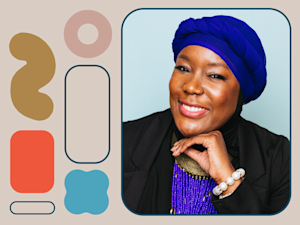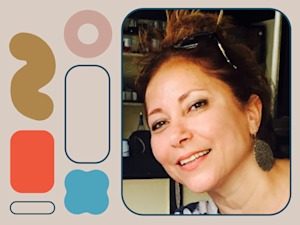Stay in the know
All our latest podcasts delivered right to your inbox.
Many kids with learning challenges love summer vacation — and their parents do, too. It’s a nice long break from studying, homework, and the classroom. And it can leave kids feeling relaxed and better equipped to learn once fall arrives. But when kids press “pause” on learning altogether, they may lose some of what they’ve learned throughout the year and experience the “summer slide.”
In this episode of The Opportunity Gap, we break down the summer slide. And we explore how parents and educators can prevent it from happening. Listen as special education teacher Kate García, MEd, explains:
Why parents should meet with their child’s teacher before summer break
How following a summer routine can help kids stay on track
Ways to help kids learn without sacrificing fun
Related resources
Episode transcript
Julian: From the Understood Podcast Network, this is "The Opportunity Gap." Kids of color who have ADHD and other common learning differences often face a double stigma. But there's a lot that families can do to address the opportunity gap in our communities. This podcast explains key issues and offers tips to help you advocate for your child.
My name is Julian Saavedra. I'm a father of two and an assistant principal in Philadelphia, where I've spent nearly 20 years working in public schools. I'll be your host.
Welcome back, listeners. Summer break is almost here. It has been a long year and the countdown is on. Man, I cannot wait. The warm weather, trips to the park or the beach. Watermelon, water ice, cookouts, hot dogs, hamburgers, all the good stuff that comes with summertime. I know I'm not alone when it comes to loving summer vacation. Lots of kids love summer vacation. Parents included. It's a nice break from the classroom, from the homework assignments, and from study.
But it's a long break from learning. And that makes it pretty easy for kids to forget what they've learned. So on today's episode, we're talking about "summer slide." What it is, and ways to help kids with learning and thinking differences get ahead of it without sacrificing that summertime fun.
To help me dive deeper into this important topic, I'd like to introduce today's guest, Kate García, MEd. Kate García is a special education teacher in Pennsylvania. She's also a former Understood Teacher Fellow. Kate and I go way back. She and I started working with Understood together. We did the fellowship together. And that's how this entire "Opportunity Gap" podcast world was born. So Kate and I are OGs of the OG. Welcome to the show, Kate. It's so nice to have you here.
Kate: Yes, thank you for having me. I'm so excited to be here.
Julian: So as we know, you know, lots of kids absolutely love summer vacation. Parents included, teachers and educators included. It's a really nice break from the classroom and from all the homework, studying, stress. Is there anything else parents should do before school breaks off for the summertime?
Kate: So you may want to meet with your child's teacher to talk about grades and performance, to talk about areas that were tricky for them or that they struggled. But it's also an important time to talk about where they thrived and what sorts of things they enjoyed. Were there particular activities in the class that they did exceedingly well with? Or things that you might not see as a parent inside that classroom. Because we want to reinforce those areas over the summer.
And if, for example, you find from the teacher that any time there was a creative writing prompt, your child brought a lot to the table to brainstorm, you can interweave various skills throughout the summer using these areas of enjoyment that they have.
It's also a great time to preview next year's curriculum or maybe the syllabus, if that's available. This is important for a few reasons. If your child struggles in a particular area, you may be able to reinforce some of that over the summer or preview concepts.
Julian: Do you have any like specific questions that families should ask? Imagine the end of the year meeting is happening and you may be reviewing an IEP. Are there any specific questions that you'd recommend families make sure that they ask?
Kate: I think it's important to ask, particularly for students with IEPs, it's important to ask about those accommodations, especially if your last meeting with that teacher or IEP team was in the fall. How did those accommodations work? Do the teachers feel there are any accommodations that were beneficial? Any that they could see helping your child in the next grade or next class?
Julian: I completely understand that sometimes families get a little bit nervous. They know the summer is coming and many of our parents are not trained educators. Even though we know our parents, you are your child's first and most important teacher. But they're not trained educators. So sometimes a lot of that jargon might get a little bit nerve-wracking. Do I know what accommodations really are? What are some of these strengths that I can do? How could — how do I do this?
And I know that in some of our IEPs and in some of our situations where students have learning and thinking differences, there's an option for extended learning. There's an option for students to have extended learning within their school program. Can you explain what extended learning, or ESY — extended school year — is? And what the difference is between that and typical summer school?
Kate: Yeah, absolutely. So extended school year or ESY is something that your IEP team should be discussing every year at the IEP meeting. And what the team does is they look at a list of qualifications to see if your child would need some of that extra support over the summer. It's typically for the month of July. And if your child meets those qualifications, then they can receive specific instruction from a special ed teacher that works on targeted goals in the areas of need. And, you know, your team is going to know your child best, and they're going to go through a list of questions to qualify your child for ESY.
But if you're not sure or you feel like maybe that was not touched on enough before the summer comes, that's a great conversation to have with your child's IEP case manager and team to make sure that you understand. Does your child qualify or not? And what the options are for summer learning if they don't qualify for ESY.
Julian: Got it. Now as a special education teacher, when do you normally or typically have that conversation with the family?
Kate: Usually at the IEP meeting, but this is a great time of year. I often have parents reach out to say, hey, we want to look at some options for the summer. I just want to make sure we are receiving all the services we possibly can. Can you — can we talk about ESY? And then we can go through those qualifications, usually based on data that looks at does your child remember things over prolonged periods of time? But there are some other qualifications depending on the age and the district.
So that's a great time to have the conversation now, before we move into the summer. But really, any time. You know, your IEP is a fluid document, so any time you feel like you want to discuss services, you can reach out to that team.
Julian: And last question about that: Is that something that families have to pay for? Is there a cost associated with ESY programs?
Kate: There is no cost associated with that. That is part of the services that if your child qualifies for that, they should get bussing. It's typically a half-day program in most districts, but it really depends on the age and the district as to what time they're able to provide that. But no, that's a no cost added.
Julian: So, you know, kids are excited to get back to school in the fall, like as much as they might fuss about going back to school, they're really — they're happy. They want to see their friends, they've relaxed. Hopefully they're a little bit well-rested. I know my kids stay up late in July and my wife and I don't really care. But you know, it's definitely a different experience than what typical school days are like. And hopefully they're coming better equipped to learn.
Obviously, this is a really good thing. But if kids don't do anything academic over the long summer break, they may experience something called summer slide. They may spend the beginning of the new school year having to relearn some skills that they may have lost over the summertime. So, Kate, as a special education teacher and an expert, what are some good first steps to getting ahead of summer slide?
Kate: I think the first is to have some sort of routine. So like you mentioned, that routine might be different than your school year routine. Your kids may be staying up a little later. You may have more flexibility around certain aspects of the routine. But kids still need some sort of predictable schedule, whether it's daily or weekly, to stay on track. The other thing is in that routine to include time for reading, for writing, educational activities. I love to include executive functioning in this area in the summer.
Julian: Can you explain what that is for our listeners? Like when you say executive function, what does that mean?
Kate: So executive functioning are all of those skills associated with time management, organization, things that are really critical to success in school that may not be explicitly taught. So the summer is a wonderful time to work on that, because no matter your child's age, you can have them do backwards planning with you. And sometimes this gets lost during the school year because we're just all so busy.
You know, you're probably still buying groceries over the summer. You can have your child work backwards with you about planning for meals for next week, organizing lists for the grocery store. Talk about time management if you're going on a trip. How many days ahead do you need to pack? How do you think about packing? Include them in those conversations and you're going to innately work on those skills of organization, time management, executive functioning.
You also can look ahead at some of next year's topics and maybe plan some trips or little day trips around it, and model to your kids how these skills are intertwined with real life. Model for your kids reading for pleasure. Without the school year pressures of a particular book they have to read, what do they enjoy reading? Maybe spend some time at a library, let them explore the different genres of books.
And overall, I'd say the most important thing is to give them grace and time, which is something that we don't often have in the school year. Because we have flexibility with scheduling. We can give them more space to enjoy the learning that they're doing. That is a big gift you can give to them in the summertime is the ability to work through things, problem-solve, and have time to find enjoyment in learning.
Julian: I think for all of our listeners, that's just a really important point to remember. Don't feel like you have to have this highly structured, amazing school-like experience every single day of the summertime. Give yourself some grace. Give your children some grace, and just let them be kids. Give them time to just explore and be kids and have fun learning and do all the things that they don't get to do during the school year.
And to be honest, like being in school now — it's stressful. For a lot of kids it's a stressful experience. Those of our students who have learning and thinking differences, it could be even more stressful. And so the summertime can be a place where they can just relax a little bit. Obviously, don't lose the routine, but make sure that you're giving yourself some of that grace.
One tip that I would throw out there: In our household, we have a whiteboard that we write down all the activities that we're going to do for the day, and we go over it at breakfast every morning. My wife and I are fortunate to be educators, so we have the summers off together. So, you know, it's Saavedra Day Camp all summer long. And we definitely go over what our activities are. And it's a really good way to get kids to internalize having a schedule and a routine.
Kate: Yeah, I think that's wonderful. And the other thing I wanted to add about enjoying learning is as parents, it's helpful to just be in the moment and watch your kid enjoy what they're learning. Watch them explore, and be present in that moment. And you're not always present for that moment if you're not in the classroom with them. So watch that little light bulb go off over their head, listen to the questions, absorb it and take it all in.
Julian: Right. There are so many different ways that families can help their children stop summer slide. Think of it this way: Every single moment can be used as a fun learning opportunity. In the Saavedra household, or aka Saavedra Day Camp, we often ask ourselves how can we use this moment to make a fun but educational memory? That's like the trick of having teachers for parents, my poor kids.
But I also want to throw out there — there's a lot of our families might not have the privilege of having the full summer off from work. And so there are a lot of costs associated with the summertime. Can you give us some examples of low-cost or no-cost ways that parents can help kids keep learning without having to sacrifice the fun?
Kate: Absolutely. So one of the ways is to use dinnertime or any family time that you have outside of your work or camp hours, if your kids are attending camp. The other is on weekends, you can visit the library. Many libraries have passes to local museums or other local places like arboretums, or maybe even specialty tickets to places that are running particular events near you.
Julian: Shout-out to the Philly Free Library, Elkins Park Library in Cheltenham, Montgomery County Libraries. We use them all the time.
Kate: They have a lot and they often have online resource databases for you to look before you actually go to the library to see if they have the passes. And you can often keep them for a few days. You know, even if you're traveling to a new city, you can look ahead into that and get some money-saving on visiting a museum or the arboretum or any of those locations.
If your kid is attending a summer camp, I would encourage you to focus on some of those social skills and look at self-advocacy and really hone in on that. Sometimes the social skills and the self-advocacy we lose in the school year because the academics take the forefront. So when your child comes home and you're having those conversations about their day, try to ask a lot of questions. How did that interaction go, and how do you think that person felt? And work on those skills that are going to only help them when they go into the next school year.
Julian: Yeah, I definitely, I agree with that. I think something that works in our house is, you know, when the kids do go to camp, we will tell the camp ahead of time that we have certain things that we're trying to work on. And then we ask our kids to give us names of kids that they played with that day. Hey, who'd you play with today? This person. Tell us how it went. Tell me about what you guys talked about. How did you feel when you were playing together?
Because like you said, there's ways that we can specifically build up those advocacy skills. And a lot of times they're doing it. They just don't realize it unless we name it for them. And that can be a really quick five-minute conversation when you guys are having snack, dinner together at night.
Kate: Yeah, I agree. And I think another way is when you're doing your errands or you're going out into the community to include your kids in those conversations and name it for them. For example, we like to go to farmers markets and look around at local vendors and see what's there. It's a great opportunity to talk about price and money. And sometimes my daughter will see something she likes and we'll say, OK, well next week we're going to bring back this amount of money. And then when she goes to purchase it, she's interacting with the cashier saying, OK, this is what I would like. And if they don't have it, we have to problem-solve.
So all of those sorts of mundane activities can become an opportunity for your child to step into themself and learn how to have interactions, speak up for themselves. And maybe some education in there too. You know, let's count the change and make sure the person gave you the right amount of money. All of those sorts of things.
Julian: Kate, those are all really good. One thing that would be really helpful for a lot of our listeners: Are there any websites that are free or just websites in general that list fun activities for families that that you use?
Kate: Yes. So there's one that I love. I've been using it for a few years now. It's called Mommy Poppins. And I love it because, so I'm located near Philadelphia, which is a major metropolitan area. So I know they have a lot of various cities listed. They also have some online ones. But the wonderful thing about this site is it's free to use, and you can search a few different ways. So they typically come out with activity guides prior to various seasons, holidays, and they also have a calendar feature.
So you can go on, for example, if you know you're going to be off on Memorial Day and you can click on that particular date. And a bunch of options are going to pop up. And you can get directed to, you know, if it's an individual museum site and maybe buy tickets for an exhibit. Or they'll show this farm is having a special day. And you can plan some of your days for the summer or just the weekends in general around that. And it's a really nice resource to check out.
And the other thing I'd say is there's many Instagram pages that are local to your county or city that are going to have weekend events posted either for free or ticketed events that you can look into.
Julian: What a great recommendation. Yeah, I definitely make use of that a lot. I think it's really important to just find as many activities as possible. And you'd be surprised how many cool things are happening all across the country. Whatever region you're in, there's a lot of activities constantly happening. So great recommendation.
Kate, I wish we could talk forever, but I just really appreciate your expertise and your knowledge, and you know, it's just great seeing you again. It's a throwback to our fellowship times.
Kate: Yeah, it's been great being on.
Julian: Really appreciate it. And you just shared so many helpful tips and resources. So again, I really appreciate your time. Thank you.
Kate: Thanks for having me.
Julian: Listeners, this was an amazing conversation. And I want to thank Kate for joining me today. Grace and time. Grace and time. That's the thing we need you to remember. It's still resonating with me, too.
Before we go, I'd like to share some resources. We'll also link to them in the show notes. The first is Understood.org's article "Summer Learning: How to Help Your Child Keep Skills Strong." Another Understood article, "Extended School Year Services: What You Need to Know." Then there is Mommy Poppins. Shout-out to that website, a free resource Kate recommended for families. Be sure to check these out. Thank you so much. Take care.
You've been listening to "The Opportunity Gap" from the Understood Podcast Network. This show is for you, so we want to make sure you're getting what you need. Is there a topic you'd like us to cover? We want to hear from you. Email us at OpportunityGap@Understood.org.
If you want to learn more about the topics we covered today, check out the show notes for this episode. We include more resources as well as links to anything we mentioned in the episode.
Understood.org is a resource dedicated to helping people who learn and think differently discover their potential and thrive. Learn more at understood.org/mission.
"The Opportunity Gap" is produced by Tara Drinks, edited by Cin Pim. Briana Berry is our production director. Our theme music was written by Justin D. Wright, who also mixes the show. For the Understood Podcast Network, Laura Key is our editorial director, Scott Cocchiere is our creative director, and Seth Melnick is our executive producer. Thanks for listening, and see you next time.
Host

Julian Saavedra, MA
is a school administrator who has spent 15 years teaching in urban settings, focusing on social-emotional awareness, cultural and ethnic diversity, and experiential learning.
Latest episodes

April 10, 2024
Myths and misinformation about ADHD and learning differences show up all the time on social media. Find out what’s fact and what’s fiction, and learn about the impact of these myths on kids of color.

March 27, 2024
ADHD advocate René Brooks was diagnosed with ADHD twice as a child. But it wasn’t until she was diagnosed again as an adult that she finally got support. Listen to her story.

March 13, 2024
Learn about the steps to getting an IEP and starting your child’s special education program. Get tips from an expert.

February 14, 2024
Learn how four members of the Understood team are making an impact in the lives of people with learning and thinking differences.

January 31, 2024
How can high-schoolers and their families prepare for life after high school? Get advice and tips from a college advisor.

January 17, 2024
Some kids don’t like to share information about their school day. Get tips on how to get them to open up and share. These tips and conversation starters can help your child to open up.

January 3, 2024
The school-to-prison pipeline has disrupted education for kids of color for a long time. Learn what the pipeline is and why it’s critical to end it.

December 6, 2023
Telling your relatives about your child’s challenges can be difficult. Get tips on how to make the talk easier to manage.

November 8, 2023
For some students of color, feeling mistreated by teachers is a common experience — and it shouldn’t be. Learn how to help kids self-advocate.

October 25, 2023
Dyslexia is a common learning difference that impacts many kids of color. Hear from an expert and learn ways to support kids in the classroom.
